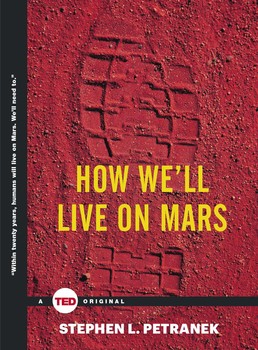
Aug 10, 2015 | Blog, Book Reviews, Commercial Space, Education, European Space Agency, International Cooperation, International Space Station, Space Shuttle, NASA, Kids Space, Mars, Orion Crew Exploration Vehicle, Why Space
New Books for Future Mars Settlers There are two new and invaluable books on Mars, both of them ideal for those ready to settle down on the Red Planet: – How We’ll Live on Mars by Stephen Petranek – The International Mars Research Station – An exciting new plan to...
May 31, 2015 | Benefits of Space Exploration, Blog, Book Reviews, Education, Education Station, Exploration, International Cooperation, International Space Station, NASA, Planet Earth, Space Shuttle
The Orbital Perspective – Lessons in Seeing the Big Picture from a Journey of 71 Million Miles by Ron Garan; Berrett-Koehler Publishers, Inc.; $27.95 (Hardcover); 2015. There have been a number of “tell-all” books authored by former space travelers. But this...
Jan 1, 2015 | Ask the Expert, Benefits of Space Exploration, Blog, Education Station, Exploration, International Cooperation, Kids Space, Mars, Multimedia, NASA, Why Space
Fareed Zakaria is the host of CNN’s Global Public Square (GPS). “Americans used to understand moonshots inspire us, but also power America’s future,” Zakaria notes in a recent tweet. The GPS special airing called “Moonshots” on Sunday, January 4 at 10 a.m. and 1 p.m....
Dec 1, 2014 | Benefits of Space Exploration, Blog, Education Station, Exploration, International Cooperation, Kids Space, NASA, Our Solar System, Space and Science, The Sun
Scientists have discovered an “invisible shield” roughly 7,200 miles (11,500 kilometers) above Earth that blocks so-called “killer electrons” – highly charged electrons that can fry satellites, degrade space systems during intense solar storms, and pose...
Nov 22, 2014 | Blog, Book Reviews, Education Station, International Cooperation, Kids Space, NASA, Planet Earth, Uncategorized
A new book – Sanctuary: Exploring the World’s Protected Areas from Space – offers a stunning look at current global conservation challenges here on Earth and explores the role that information generated by remote-sensing satellites plays in effective terrestrial and...
Nov 7, 2014 | Blog, Comets, Education Station, European Space Agency, Exploration, International Cooperation, Kids Space, NASA, Space and Science
The European Space Agency’s Rosetta spacecraft is set to deploy its Philae lander for a first-time touchdown on a comet. On November 11-12, Philae is set to separate from Rosetta at 09:03 GMT (10:03 CET) and touch down on Comet 67P/Churyumov-Gerasimenko at...
Oct 25, 2014 | Ask the Experts — Answers, Benefits of Space Exploration, Blog, Canadian Space Agency, China, Commercial Space, Education Station, European Space Agency, International Cooperation, Japan Aerospace Exploration Agency (JAXA), Kids Space, NASA, Space Race, Why Space
The Organization for Economic Cooperation and Development (OECD) has unveiled their new report: The Space Economy at a Glance 2014. The report provides a statistical overview of the global space sector and its contributions to economic activity. This new edition...
Oct 3, 2014 | Benefits of Space Exploration, Blog, Education Station, Exploration, International Cooperation, Kids Space, Space and Science, Space Research, Why Space
For the first time in history the public will be able to vote for the official name of stars and planets. The International Astronomical Union (IAU) is inviting all public organizations with an interest in astronomy to register on the IAU Directory for World Astronomy...
Sep 15, 2014 | Blog, Comets, Education Station, European Space Agency, Exploration, International Cooperation, Kids Space, Our Solar System
The European Space Agency has picked a spot for the Philae lander touchdown on Comet 67P/Churyumov–Gerasimenko. According to ESA, Site J offers unique scientific potential, with hints of activity nearby, and minimum risk to the lander compared to the other candidate...
Sep 8, 2014 | Asteroid Exploration, Blog, Education Station, European Space Agency, Exploration, International Cooperation, International Space Station, Kids Space, Mars, NASA, Planet Earth, Space and Science, Space Research, The Moon
It’s called a “science splashdown.” The undersea environment is the closest analogue on Earth to a gravity-weak environment like that of asteroids, the moons of Mars or Mars itself. Therefore, other than being in outer space, going to inner-space is the best place to...


